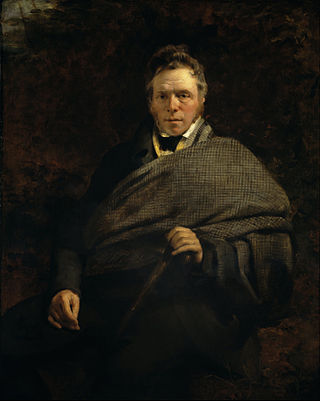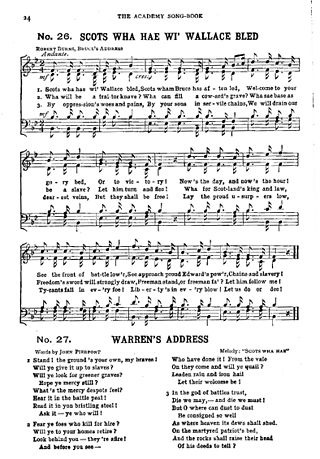Related Research Articles

James Hogg was a Scottish poet, novelist and essayist who wrote in both Scots and English. As a young man he worked as a shepherd and farmhand, and was largely self-educated through reading. He was a friend of many of the great writers of his day, including Sir Walter Scott, of whom he later wrote an unauthorised biography. He became widely known as the "Ettrick Shepherd", a nickname under which some of his works were published, and the character name he was given in the widely read series Noctes Ambrosianae, published in Blackwood's Magazine. He is best known today for his novel The Private Memoirs and Confessions of a Justified Sinner. His other works include the long poem The Queen's Wake (1813), his collection of songs Jacobite Relics (1819), and his two novels The Three Perils of Man (1822), and The Three Perils of Woman (1823).
Jacobite Relics is a two volume collection of songs related to the Jacobite risings, compiled by the Scottish poet and novelist James Hogg on commission from the Highland Society of London in 1817. Most of the songs in the collection are Jacobite, and a minority are Whig. A number of the songs were written or adapted by Robert Burns and scholars speculate as to how many of them were authored or at least substantially altered by Hogg himself.
"The Skye Boat Song" is a late 19th-century Scottish song adaptation of a Gaelic song composed c.1782 by William Ross, entitled Cuachag nan Craobh. In the original song, the composer laments to a cuckoo that his unrequited love, Lady Marion Ross, is rejecting him. The 19th century English lyrics instead evoked the journey of Prince Charles Edward Stuart from Benbecula to the Isle of Skye as he evaded capture by government soldiers after his defeat at the Battle of Culloden in 1746.
"The Bonnie Earl o' Moray" is a popular Scottish ballad, which may date from as early as the 17th century.

"Scots Wha Hae" is a patriotic song of Scotland written using both words of the Scots language and English, which served for centuries as an unofficial national anthem of the country, but has lately been largely supplanted by "Scotland the Brave" and "Flower of Scotland".
"Highland Laddie", also known as "Hielan' Laddie", is the name of a Scottish popular folk tune "If Thou'lt Play Me Fair Play", but as with many old melodies various sets of words can be sung to it, of which Robert Burns's poem "Highland Laddie" is probably the best known. "If Thou'lt Play Me Fair Play" has been reworked several times since Burns set down his words, Donkey Riding being one variant.

"The Hundred Pipers" is a Scottish song and jig attributed to Carolina Nairne, Lady Nairne and popularised from 1852 onwards. It takes as its themes events during and after the Jacobite Rising of 1745.
"Hey, Johnnie Cope, are Ye Wauking Yet?", also "Hey Johnnie Cope, are you awake yet?", "Heigh! Johnnie Cowp, are ye wauken yet?", or simply "Johnny Cope" is a Scottish folk song that also features in bagpipe recitals.

"The Bonnie Banks o' Loch Lomond", or "Loch Lomond" for short, is a Scottish song. The song prominently features Loch Lomond, the largest Scottish loch, located between the council areas of West Dunbartonshire, Stirling and Argyll and Bute. In Scots, "bonnie" means "attractive", "beloved", or "dear".

25 Scottish Songs was composed by Ludwig van Beethoven. The work was published in London and Edinburgh in 1818, and in Berlin in 1822.
Braes o' Killiecrankie is the name of four distinct folk songs, all originally from Scotland.
"Ye Jacobites by Name" is a traditional Scottish folk song which goes back to the Jacobite risings in Scotland (1688–1746). While the original version simply attacked the Jacobites from a contemporaneous Whig point of view, Robert Burns rewrote it in around 1791 to give a version with a more general, humanist anti-war, but nonetheless anti-Jacobite outlook. This is the version that most people know today.
The (Bonnie) Rantin' Laddie or Lord Aboyne is a traditional Scottish folk ballad telling of the valiant rescue of his lover by a noble Highland lord.

Parcel of Rogues is the fifth studio album by English folk rock group Steeleye Span. It was released in 1973 by Chrysalis Records. The album was their most successful album thus far, breaking into the Top 30.
"Bonnie Charlie", also commonly known as "Will ye no come back again?", is a Scots poem by Carolina Oliphant, set to a traditional Scottish folk tune. As in several of the author's poems, its theme is the aftermath of the Jacobite Rising of 1745, which ended at the Battle of Culloden. Written well after the events it commemorates, it is not a genuine Jacobite song, like many other songs that were "composed in the late eighteenth and nineteenth centuries, but ... passed off as contemporary products of the Jacobite risings."
"Roses of Prince Charlie" is a modern Scottish folk song composed by Ronnie Browne of The Corries. It was written circa 1973 and first appeared in their album released in 1974, Live From Scotland Volume 1. The title of the song refers to the symbol of Charles Edward Stuart, which was a white rose. The words represent Jacobitism and modern Scottish Nationalism.

Cam Ye o'er frae France? is a Scots folk song from the time of the Jacobite rebellions of the 18th century. It satirises the marital problems of the Hanoverian George I.
The Forest Minstrel (1810) is an anthology of 83 songs, assembled by James Hogg, divided into four sections: 'Pathetic Songs', 'Love Songs', 'Humorous Songs', and 'National Songs'. Hogg himself is the author of 56 items. There are also 15 by Thomas Mounsey Cunningham, 5 by John Grieve, 3 by William Laidlaw, 3 by James Gray, and one perhaps by John Ballantyne.
Lock the Door, Lariston is a border ballad by the Scottish poet James Hogg, the "Ettrick Shepherd", first published in 1811. It describes a sixteenth-century armed raid by English border reivers across the Anglo-Scottish border, met and defeated by Scottish borderers led by Jock Elliott of Lariston. Written in a traditional form, it was set to music by the 1850s, and is now a commonly performed Scottish folk song.
Jean Lorimer (1775–1831) was a friend of the poet Robert Burns, often referred to by him as the "Lassie wi' the lint-white locks" or "Chloris". Lorimer was born at Craigieburn House on a small estate near Moffat and from 1788 to 1791 was a neighbour of Burns when he was living at Ellisland Farm, her father's new farm being at Kemmishall or Kemys Hall, Kirkmahoe Parish, two miles to the south of Ellisland on the opposite bank of the Nith. Burns commented "The Lady on whom it was made, is one of the finest women in Scotland" in a letter to George Thomson, enclosing one of the two dozen or so songs that he wrote for her. They first met when she was a teenager through his excise duties bringing him to their farm.
References
- ↑ J. Murray Neil, The Scots Fiddle: (Vol 1) Tunes, Tales & Traditions of the North-East & Central Highlands (1991), No 114, p.152.
- ↑ Graham, George Farquhar (1848). The Songs of Scotland: Adapted to Their Appropriate Melodies, Volume 1. Wood and Company. pp. 74–75.
- ↑ Hogg, James (1831). Songs, by the Ettrick shepherd. William Blackwood. p. 13.
- ↑ Lee, Sidney, ed. (1900). . Dictionary of National Biography . Vol. 62. London: Smith, Elder & Co.
- ↑ "English Folk Dance and Song Society: The National Organisation for the Development of the Folk Arts". www.vwml.org.